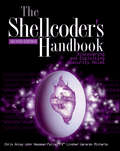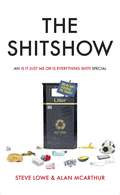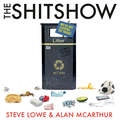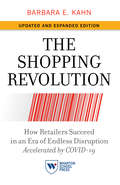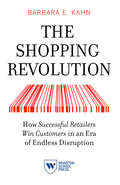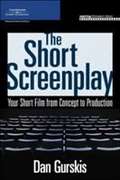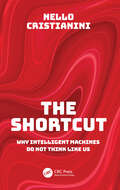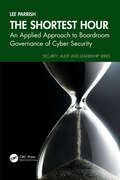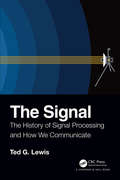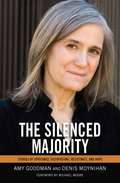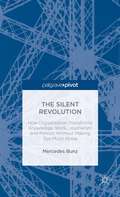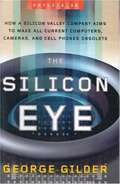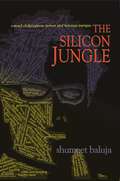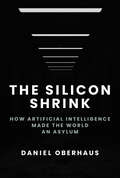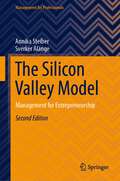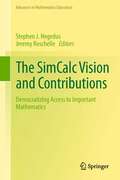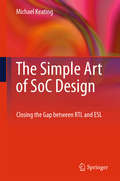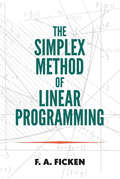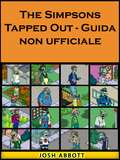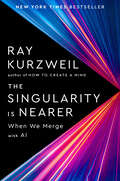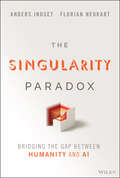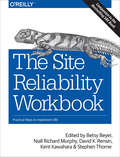- Table View
- List View
The Shellcoder's Handbook, Second Edition: Discovering and Exploiting Security Holes
by Chris Anley John Heasman Felix Fx" Lindner Gerardo RicharteThis much-anticipated revision, written by the ultimate group of top security experts in the world, features 40 percent new content on how to find security holes in any operating system or application New material addresses the many new exploitation techniques that have been discovered since the first edition, including attacking "unbreakable" software packages such as McAfee's Entercept, Mac OS X, XP, Office 2003, and Vista Also features the first-ever published information on exploiting Cisco's IOS, with content that has never before been explored The companion Web site features downloadable code files
The Shelly Cashman Series Microsoft 365 & Office 2021 Introductory
by Sandra Cable Steven Freund Ellen Monk Susan Sebok Joy StarksHelping you quickly get up to speed, THE SHELLY CASHMAN SERIES MICROSOFT 365 & OFFICE 2021 INTRODUCTORY, 1st edition, includes the latest on Microsoft 365 and Office 2021 features along with enhanced support for Mac users. Its trademark step-by-step, screen-by-screen, project-based approach enables you to expand your understanding of Office applications through hands-on experimentation and critical thinking. Module Learning Objectives are mapped to Microsoft Office Specialist (MOS) certification objectives, reinforcing the critical skills needed for college and career success. Other Ways boxes reveal alternate click paths to achieve a step, while BTW call-outs offer helpful hints as you work through your projects so you can make the most of Microsoft Office tools. In addition, MindTap and SAM (Skills Assessment Manager) online resources help maximize your study time -- and results.
The Shitshow: An ‘Is It Just Me Or Is Everything Shit?' Special
by Steve Lowe Alan McArthurIt was shit. Then the shit hit the fan. Would someone find a way of making it worse? Of course they would! Welcome to THE SHITSHOW...'There's a lot going on these days. Trump, Brexit, Call the Midwife . . . The rise of the robots . . . The rise of Easy Peelers . . .The authors of the bestselling Is It Just Me Or Is Everything Shit? series present an hilarious examination of the new age, asking:~Is Donald Trump a literary character?~The AI/robot takeover: has it already happened?~Are the animals ganging up on us too?~What is an LGBT sandwich?~Would you like to make it as an influencer?~Is Brexit Britain like the 1950s, or the 1930s, or, er, the 780s?~What is 5G?~What is consciousness?~Do you need a smart toilet?~Are you stronger than clickbait?Just get on with it!Whatever 'it' is.
The Shitshow: An ‘Is It Just Me Or Is Everything Shit?' Special
by Steve Lowe Alan McArthurIt was shit. Then the shit hit the fan. Would someone find a way of making it worse? Of course they would! Welcome to THE SHITSHOW...'There's a lot going on these days. Trump, Brexit, Call the Midwife . . . The rise of the robots . . . The rise of Easy Peelers . . .The authors of the bestselling Is It Just Me Or Is Everything Shit? series present an hilarious examination of the new age, asking:~Is Donald Trump a literary character?~The AI/robot takeover: has it already happened?~Are the animals ganging up on us too?~What is an LGBT sandwich?~Would you like to make it as an influencer?~Is Brexit Britain like the 1950s, or the 1930s, or, er, the 780s?~What is 5G?~What is consciousness?~Do you need a smart toilet?~Are you stronger than clickbait?Just get on with it!Whatever 'it' is.
The Shitshow: An ‘Is It Just Me Or Is Everything Shit?' Special
by Steve Lowe Alan McArthurIt was shit. Then the shit hit the fan. Would someone find a way of making it worse? Of course they would! Welcome to THE SHITSHOW...'There's a lot going on these days. Trump, Brexit, Call the Midwife . . . The rise of the robots . . . The rise of Easy Peelers . . .The authors of the bestselling Is It Just Me Or Is Everything Shit? series present an hilarious examination of the new age, asking:~Is Donald Trump a literary character?~The AI/robot takeover: has it already happened?~Are the animals ganging up on us too?~What is an LGBT sandwich?~Would you like to make it as an influencer?~Is Brexit Britain like the 1950s, or the 1930s, or, er, the 780s?~What is 5G?~What is consciousness?~Do you need a smart toilet?~Are you stronger than clickbait?Just get on with it!Whatever 'it' is.
The Shopping Revolution, Updated and Expanded Edition: How Retailers Succeed in an Era of Endless Disruption Accelerated by COVID-19
by Barbara E. KahnFeatured in The New York Times, Bloomberg, and Vox, The Shopping Revolution is “a brisk and thought-provoking anatomy of shopping in the 21st century” (Kirkus Reviews).The retail industry was already in the midst of unparalleled disruption. Then came COVID-19.In a fully updated and expanded edition of The Shopping Revolution: How Retailers Succeed in an Era of Endless Disruption Accelerated by COVID-19, Wharton professor Barbara E. Kahn, a foremost retail expert, examines the companies that have been most successful during a tsunami of change in the industry. She offers fresh insights into what we can learn from these companies’ ascendance and continued transformation in the face of unprecedented challenges. Kahn, also the author of Global Brand Power: Leveraging Branding for Long-Term Growth, examines:In a brand-new chapter, how companies in China, like Alibaba, JD.com, and Pinduoduo have changed the game;How Amazon became the retailer of choice for a large portion of the US population, and how other companies have chosen to work with them or have to compete against them; How Walmart beat out other grocers in the late 1990s to become the leader in food retailing, and how they must pivot to hold their leadership position today; How Warby Parker dared to compete against Luxottica in the lucrative eyewear business, and what that can tell start-ups about how to carve out a niche against a Goliath; How Sephora drew away customers from once-dominant department stores to become the go-to retailers for beauty products. Kahn argues we are just witnessing the start of the radical changes in retail that have been hastened by the pandemic and will revolutionize shopping in every way. Building on these insights, Kahn offers a framework that any company can use to create a competitive strategy to survive and thrive in today’s—and tomorrow’s—retail environment.
The Shopping Revolution: How Successful Retailers Win Customers in an Era of Endless Disruption
by Barbara E. KahnAmazon disrupts everything it touches and upends any market it enters. In the era of its game-changing dominance, how can any company compete? We are just witnessing the start of the radical changes in retail that will revolutionize shopping in every way. As Amazon and other disruptors continue to offer ever-greater value, customers’ expectations will continue to ratchet up, making winning (and keeping) those customers all the more challenging. For some retailers, the changes will push customers permanently out of their reach—and their companies out of business. In The Shopping Revolution, Barbara E. Kahn, a foremost retail expert and professor at The Wharton School, examines the companies that have been most successful during this wave of change, and offers fresh insights into what we can learn from their ascendance. How did Amazon become the retailer of choice for a large portion of the US population, and how can other companies work with them or compete with them?How did Walmart beat out other grocers in the late 1990s to become the leader in food retailing, and how must they pivot to hold their leadership position today?How did Warby Parker make a dent in the once-untouchable Luxottica's lucrative eyewear business, and what can that tell start-ups about how to unseat a Goliath?How did Sephora draw customers away from once-dominant department stores to become the go-to retailers for beauty products, and what can retailers learn from their success?How are luxury and fast-fashion retailers competing in the ever-changing, fickle world of fashion?Building on these insights, Kahn offers a framework that any company can use to create a competitive strategy to survive and thrive in today’s—and tomorrow’s—retail environment.The Shopping Revolution is a must-read for those in the retailing business who want to develop an effective strategy, entrepreneurs looking at starting their own business, and anyone interested in understanding the changing landscape in which they are shopping.
The Short Screenplay: Your Short Film from Concept to Production
by Dan GurskisWith the growth of film festivals, cable networks, specialty home video, and the Internet, there are more outlets and opportunities for screening short films now than at any time in the last 100 years. But before you can screen your short film, you need to shoot it. And before you can shoot it, you need to write it. The Short Screenplay provides both beginning and experienced screenwriters with all the guidance they need to write compelling, filmable short screenplays. Explore how to develop characters that an audience can identify with. How to create a narrative structure that fits a short time frame but still engages the audience. How to write dialogue that's concise and memorable. How to develop story ideas from concept through final draft. All this and much more is covered in a unique conversational style that reads more like a novel than a "how-to" book. The book wraps up with a discussion of the role of the screenplay in the production process and with some helpful (and entertaining) sample scripts. This is the only guide you'll ever need to make your short film a reality!
The Shortcut: Why Intelligent Machines Do Not Think Like Us
by Nello CristianiniAn influential scientist in the field of artificial intelligence (AI) explains its fundamental concepts and how it is changing culture and society.A particular form of AI is now embedded in our tech, our infrastructure, and our lives. How did it get there? Where and why should we be concerned? And what should we do now? The Shortcut: Why Intelligent Machines Do Not Think Like Us provides an accessible yet probing exposure of AI in its prevalent form today, proposing a new narrative to connect and make sense of events that have happened in the recent tumultuous past, and enabling us to think soberly about the road ahead.This book is divided into ten carefully crafted and easily digestible chapters. Each chapter grapples with an important question for AI. Ranging from the scientific concepts that underpin the technology to wider implications for society, it develops a unified description using tools from different disciplines and avoiding unnecessary abstractions or words that end with -ism. The book uses real examples wherever possible, introducing the reader to the people who have created some of these technologies and to ideas shaping modern society that originate from the technical side of AI. It contains important practical advice about how we should approach AI in the future without promoting exaggerated hypes or fears.Entertaining and disturbing but always thoughtful, The Shortcut confronts the hidden logic of AI while preserving a space for human dignity. It is essential reading for anyone with an interest in AI, the history of technology, and the history of ideas. General readers will come away much more informed about how AI really works today and what we should do next.
The Shortest Hour: An Applied Approach to Boardroom Governance of Cyber Security (ISSN)
by Lee ParrishIndependent directors of corporate boards understand the importance of cyber security as a business issue. Increased regulatory requirements, the onslaught of breaches, as well as the replacement of the corporate network perimeter with more third-party partnerships have all contributed to cyber security rising to the top of enterprise risks. Yet, many directors only receive a few brief cyber security updates during the year. Moreover, many directors have devoted their careers to other important business disciplines and may not fully grasp the technical concepts of cyber security.The challenge is that many publications on board cyber security governance address the topic at such a high level that it removes the important context of the cyber security details—or covers the topic too deeply with hard-to-understand technical language. These resources may often provide lists of security questions for directors to ask of their management team, but they do not provide the answers to the questions so that actionable oversight can be performed. What I would have wanted, and why you are probably reading this book summary, is a resource that delivers the questions to ask but also provides the answers and in a narrative, easy-to-understand style.An award-winning Chief Information Security Officer with over two decades of working with multiple Fortune 500 boards, Lee Parrish provides an example-laden vision to improve cyber security governance in the boardroom. Additionally, Lee deciphers the technical jargon to increase the reader’s cyber fluency—not to make you a cyber expert but to help you be able to ask direct questions, understand the answers provided, challenge strategies, and advise on important cyber decisions.Pick up your copy of The Shortest Hour: An Applied Approach to Boardroom Governance of Cyber Security today and start your journey on achieving more effective cyber security oversight.Want to learn more? Please visit www.novelsecurity.com
The Signal: The History of Signal Processing and How We Communicate
by Ted LewisComputers are the foundation of the information age, but communication technology is the foundation of the foundation. Without the theories and practical applications of theory brought to us by the pioneers of communication, the computer age would perhaps have remained in the back office, hidden away as infrastructure like electricity or running water – critical to modern life, but not as transforming as the combination of communications and computing. The information age exploded once machines were endowed with the ability to talk among themselves. The Signal connects everything to everything else, in both communication, and in the metaphorical sense as the link between and among people. Features Identifies the key ideas underlying modern communications technology, and documents the contributions of its inventors Explores the signal in communication, and also in the metaphorical sense as the link between and among people Leads the reader through a journey from ancient number systems to Voyager II to radio and MP3s to quantum cryptography Includes coverage of "Signals from Hell," including memes and "fake news" on the Internet Looks to the future of communication, with emergent 5G
The Silenced Majority: Stories of Uprisings, Occupations, Resistance, and Hope
by Amy Goodman Denis MoynihanAmy Goodman and Denis Moynihan provide a vivid record of the events, conflicts, and social movements shaping our society today. They give voice to ordinary people standing up to corporate and government power across the country and around the world. Their writing and daily work at the grassroots public TV/radio news hour Democracy Now!, carried on more than a thousand stations globally and at democracy now. org, casts in stark relief the stories of the silenced majority. These stories are set against the backdrop of the mainstream media's abject failure, with its small circle of pundits who know so little about so much, attempting to explain the world to us and getting it so wrong.
The Silent Revolution: How Digitalization Transforms Knowledge, Work, Journalism and Politics without Making Too Much Noise
by Mercedes BunzCritically engaging, illustrative and with numerous examples, The Silent Revolution delivers a philosophically informed introduction to current debates on digital technology and calls for a more active role of humans towards technology.
The Silicon Eye: How A Silicon Valley Company Aims to Make All Current Computers, Cameras and Cell Phones Obsolete
by George GilderThe Silicon Eye is a narrative of some of the smartest - and most colorful - people on earth and their race to transform an entire industry.
The Silicon Jungle: A Novel of Deception, Power, and Internet Intrigue
by Shumeet BalujaA suspenseful story about the dangers of unknowingly revealing our most intimate thoughts and actions onlineWhat happens when a naive intern is granted unfettered access to people's most private thoughts and actions? Stephen Thorpe lands a coveted internship at Ubatoo, an Internet empire that provides its users with popular online services, from a search engine and e-mail, to social networking. When Stephen’s boss asks him to work on a project with the American Coalition for Civil Liberties, Stephen innocently obliges, believing he is mining Ubatoo’s vast databases to protect people unfairly targeted in the name of national security. But nothing is as it seems. Suspicious individuals surface, doing all they can to access Ubatoo’s wealth of confidential information. This need not require technical wizardry—simply knowing how to manipulate a well-intentioned intern may be enough.The Silicon Jungle is a cautionary fictional tale of data mining’s promise and peril. Baluja raises ethical questions about contemporary technological innovations, and how minute details can be routinely pieced together into rich profiles that reveal our habits, goals, and secret desires—all ready to be exploited.
The Silicon Shrink: How Artificial Intelligence Made the World an Asylum
by Daniel OberhausWhy the race to apply AI in psychiatry is so dangerous, and how to understand the new tech-driven psychiatric paradigm.AI psychiatrists promise to detect mental disorders with superhuman accuracy, provide affordable therapy for those who can’t afford or can’t access treatment, and even invent new psychiatric drugs. But the hype obscures an unnerving reality. In The Silicon Shrink, Daniel Oberhaus tells the inside story of how the quest to use AI in psychiatry has created the conditions to turn the world into an asylum. Most of these systems, he writes, have vanishingly little evidence that they improve patient outcomes, but the risks they pose have less to do with technological shortcomings than the application of deeply flawed psychiatric models of mental disorder at unprecedented scale. Oberhaus became interested in the subject of mental health after tragically losing his sister to suicide. In the book, he argues that these new, ostensibly therapeutic technologies already pose significant risks to vulnerable people, and they won’t stop there. These new breeds of AI systems are creating a psychiatric surveillance economy in which the emotions, behavior, and cognition of everyday people are subtly manipulated by psychologically savvy algorithms that have escaped the clinic. Oberhaus also introduces readers to the concept of “swipe psychology,” which is quickly establishing itself as the dominant mode of diagnosing and treating mental disorders. It is not too late to change course, but to do so means we must reckon with the nature of mental illness, the limits of technology, and what it means to be human.
The Silicon Valley Model: Management for Entrepreneurship (Management for Professionals)
by Annika Steiber Sverker AlängeThe first edition of The Silicon Valley Model, published in 2016, addresses the need for a fundamentally new approach to managing and developing large firms with an emphasis on entrepreneurship. This second edition validates, extends, and updates these original findings. While still encompassing the observations and analysis featured in the first edition, this new edition addresses new developments in management and in the global business environment. Further, it presents Dr. Steiber’s research identifying more companies in Asia, Europe, and the USA that are implementing management approaches that parallels the Silicon Valley Model, and in some respects, advanced upon it. New material, appearing mainly in the “Recent Developments” sections in each chapter, includes both real-life events and new research findings related to the management principles for entrepreneurship. In some cases, elements of innovation and development of the Silicon Valley Model have taken new forms in response to changing times or the desires of the companies involved. The Silicon Valley Model, Second Edition is beneficial to executives from the board and CEO level on down, consultants, researchers, and others who study or work with new developments in management.
The SimCalc Vision and Contributions
by Jeremy Roschelle Stephen J. HegedusThis volume provides essential guidance for transforming mathematics learning in schools through the use of innovative technology, pedagogy, and curriculum. It presents clear, rigorous evidence of the impact technology can have in improving students learning of important yet complex mathematical concepts -- and goes beyond a focus on technology alone to clearly explain how teacher professional development, pedagogy, curriculum, and student participation and identity each play an essential role in transforming mathematics classrooms with technology. Further, evidence of effectiveness is complemented by insightful case studies of how key factors lead to enhancing learning, including the contributions of design research, classroom discourse, and meaningful assessment. The volume organizes over 15 years of sustained research by multiple investigators in different states and countries who together developed an approach called "SimCalc" that radically transforms how Algebra and Calculus are taught. The SimCalc program engages students around simulated motions, such as races on a soccer field, and builds understanding using visual representations such as graphs, and familiar representations such as stories to help students to develop meaning for more abstract mathematical symbols. Further, the SimCalc program leverages classroom wireless networks to increase participation by all students in doing, talking about, and reflecting on mathematics. Unlike many technology programs, SimCalc research shows the benefits of balanced attention to curriculum, pedagogy, teacher professional development, assessment and technology -- and has proven effectiveness results at the scale of hundreds of schools and classrooms. Combining the findings of multiple investigators in one accessible volume reveals the depth and breadth of the research program, and engages readers interested in: * Engaging students in deeply learning the important concepts in mathematics * Designing innovative curriculum, software, and professional development · Effective uses of technology to improve mathematics education * Creating integrated systems of teaching that transform mathematics classrooms * Scaling up new pedagogies to hundreds of schools and classrooms * Conducting research that really matters for the future of mathematics learning * Engaging students in deeply learning the important concepts in mathematics * Designing innovative curriculum, software, and professional development · Effective uses of technology to improve mathematics education * Creating integrated systems of teaching that transform mathematics classrooms * Scaling up new pedagogies to hundreds of schools and classrooms * Conducting research that really matters for the future of mathematics learning
The Simple Art of SoC Design
by Michael Keating, Synopsys FellowThis book tackles head-on the challenges of digital design in the era of billion-transistor SoCs. It discusses fundamental design concepts in design and coding required to produce robust, functionally correct designs. It also provides specific techniques for measuring and minimizing complexity in RTL code. Finally, it discusses the tradeoff between RTL and high-level (C-based) design and how tools and languages must progress to address the needs of tomorrow's SoC designs.
The Simplex Method of Linear Programming (Dover Books on Mathematics)
by F. A. FickenThis concise but detailed and thorough treatment discusses the rudiments of the well-known simplex method for solving optimization problems in linear programming. Geared toward undergraduate students, the approach offers sufficient material for readers without a strong background in linear algebra. Many different kinds of problems further enrich the presentation. The text begins with examinations of the allocation problem, matrix notation for dual problems, feasibility, and theorems on duality and existence. Subsequent chapters address convex sets and boundedness, the prepared problem and boundedness and consistency, optimal points and motivation of the simplex method, and the simplex method and tableaux. The treatment concludes with explorations of the effectiveness of the simplex method and the solution of the dual problem. Two helpful Appendixes offer supplementary material.
The Simpsons Tapped Out - Guida non ufficiale
by Joshua AbbottCostruisci la città definitiva e ottieni un sacco di denaro! Con la guida de I Simpson™ Springfield imparerai esattamente quello che ti serve sapere per diventare un giocatore esperto ed ottenere denaro e ciambelle illimitate. Questa è una guida completa con tutto ciò che ti serve sapere riguardo al gioco ed in più sarai in grado di scaricarne una copia gratuita con questo acquisto. - Come scaricare I Simpson™ Springfield gratis - Supporto per iPhone ed Android - Panoramica ed informazioni generali - Spiegazione dettagliata per strategie avanzate - Contante illimitato - Ciambelle illimitate - Come aumentare di livello in fretta - Come ottenere ciambelle gratis - Localizzazioni e i loro codici postali - Modalità di gioco e conquiste - Istruzioni facili e dettagliate - Segreti, suggerimenti e trucchi usati dai giocatori pro - E molto altro Acquista adesso e non finirai mai più i soldi o le ciambelle, Diventa un giocatore top oggi! Disclaimer: Il prodotto non è associato, affiliato, appossiato o sponsorizzato da EA Games. Né è stato revisionato, testato o certificato da EA Games. Questa guida è da usarsi come rferimento e come tale non modifica il gioco in alcun modo. Questa è una guida scritta e non un software.
The Simpsons Tapped Out Guia De Jogo
by Joshua Abbott Johann PiresCom o Guia de Jogo The Simpsons: Tapped Out você aprenderá exatamente o que você precisa saber para se tornar um jogador expert e conseguir dinheiro e donuts ilimitados! Esse é um guia completo com tudo que você precisa saber sobre o jogo e você ainda poderá fazer o download de uma cópia gratis do mesmo com essa compra. - Como fazer o Download de The Simpsons Tapped Out GRÁTIS! - Suporta iPhone & Android. - Visão Geral e Informações Básicas. - Aprenda Estratégias Avançadas! - Ganhe Dinheiro Ilimitado! - Ganhe Donuts Ilimitados! - Como Passar de Nível Mais Rápido - Como Ganhar Donuts Gratuitos! - Localizações e Seus Zip Codes - Modos de Jogo e Realizações. - Instruções Detalhadas e Fáceis de Seguir - Segredos, Dicas, Cheats, Macetes, e Truques Usados por Jogadores Pro! - E MUITO MAIS! Compre agora e nunca mais fique sem donuts ou dinheiro de novo! Se torne um jogador de altas pontuações hoje!
The Singularity Is Nearer: When We Merge with AI
by Ray KurzweilAN INSTANT NEW YORK TIMES BESTSELLERONE OF TIME&’S 100 MOST INFLUENTUAL PEOPLE IN ARTIFICIAL INTELLIGENCEThe noted inventor and futurist&’s successor to his landmark book The Singularity Is Near explores how technology will transform the human race in the decades to comeSince it was first published in 2005, Ray Kurzweil&’s The Singularity Is Near and its vision of an exponential future have spawned a worldwide movement. Kurzweil's predictions about technological advancements have largely come true, with concepts like AI, intelligent machines, and biotechnology now widely familiar to the public.In this entirely new book Ray Kurzweil brings a fresh perspective to advances toward the Singularity—assessing his 1999 prediction that AI will reach human level intelligence by 2029 and examining the exponential growth of technology—that, in the near future, will expand human intelligence a millionfold and change human life forever. Among the topics he discusses are rebuilding the world, atom by atom with devices like nanobots; radical life extension beyond the current age limit of 120; reinventing intelligence by connecting our brains to the cloud; how exponential technologies are propelling innovation forward in all industries and improving all aspects of our well-being such as declining poverty and violence; and the growth of renewable energy and 3-D printing. He also considers the potential perils of biotechnology, nanotechnology, and artificial intelligence, including such topics of current controversy as how AI will impact employment and the safety of autonomous cars, and "After Life" technology, which aims to virtually revive deceased individuals through a combination of their data and DNA.The culmination of six decades of research on artificial intelligence, The Singularity Is Nearer is Ray Kurzweil&’s crowning contribution to the story of this science and the revolution that is to come.
The Singularity Paradox: Bridging the Gap Between Humanity and AI
by Florian Neukart Anders IndsetUnderstand humanity's opportunity to create Artificial Conscious Entities in response to the singularity The Singularity Paradox: Bridging the Gap Between Humanity and AI is a comprehensive exploration of how the fusion of biology, neuroscience, and artificial intelligence can lead to the creation of Artificial Human Intelligence (AHI) as a conscious response to the unconscious development of superintelligence. You will learn about how: Singularity highlights the tension between the boundless possibilities of technological advancement and the potential loss of human autonomy, control, and relevance. AHI may become essential in navigating this singularity and preventing the severe consequences that could arise. The convergence of humanity and technology, shedding light on the ethical, social, and scientific implications of this transformation is taken on with a fresh perspective. Written by Anders Indset and Florian Neukart, The Singularity Paradox is a must-read read for anyone interested in the future of technology, artificial intelligence, neuroscience, and philosophy, as well as humanity's not-so-distant future, where science fiction may become reality.
The Site Reliability Workbook: Practical Ways to Implement SRE
by Niall Richard Murphy David K. Rensin Betsy Beyer Kent Kawahara Stephen ThorneIn 2016, Googleâ??s Site Reliability Engineering book ignited an industry discussion on what it means to run production services todayâ??and why reliability considerations are fundamental to service design. Now, Google engineers who worked on that bestseller introduce The Site Reliability Workbook, a hands-on companion that uses concrete examples to show you how to put SRE principles and practices to work in your environment.This new workbook not only combines practical examples from Googleâ??s experiences, but also provides case studies from Googleâ??s Cloud Platform customers who underwent this journey. Evernote, The Home Depot, The New York Times, and other companies outline hard-won experiences of what worked for them and what didnâ??t.Dive into this workbook and learn how to flesh out your own SRE practice, no matter what size your company is.Youâ??ll learn:How to run reliable services in environments you donâ??t completely controlâ??like cloudPractical applications of how to create, monitor, and run your services via Service Level ObjectivesHow to convert existing ops teams to SREâ??including how to dig out of operational overloadMethods for starting SRE from either greenfield or brownfield
